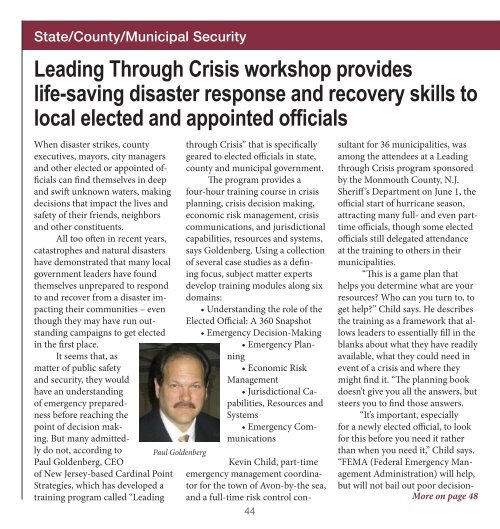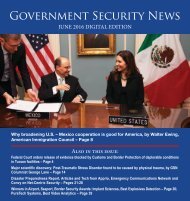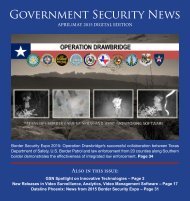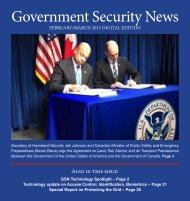Government Security News
Create successful ePaper yourself
Turn your PDF publications into a flip-book with our unique Google optimized e-Paper software.
State/County/Municipal <strong>Security</strong><br />
Leading Through Crisis workshop provides<br />
life-saving disaster response and recovery skills to<br />
local elected and appointed officials<br />
When disaster strikes, county<br />
executives, mayors, city managers<br />
and other elected or appointed officials<br />
can find themselves in deep<br />
and swift unknown waters, making<br />
decisions that impact the lives and<br />
safety of their friends, neighbors<br />
and other constituents.<br />
All too often in recent years,<br />
catastrophes and natural disasters<br />
have demonstrated that many local<br />
government leaders have found<br />
themselves unprepared to respond<br />
to and recover from a disaster impacting<br />
their communities – even<br />
though they may have run outstanding<br />
campaigns to get elected<br />
in the first place.<br />
It seems that, as<br />
matter of public safety<br />
and security, they would<br />
have an understanding<br />
of emergency preparedness<br />
before reaching the<br />
point of decision making.<br />
But many admittedly<br />
do not, according to<br />
Paul Goldenberg, CEO<br />
of New Jersey-based Cardinal Point<br />
Strategies, which has developed a<br />
training program called “Leading<br />
Paul Goldenberg<br />
through Crisis” that is specifically<br />
geared to elected officials in state,<br />
county and municipal government.<br />
The program provides a<br />
four-hour training course in crisis<br />
planning, crisis decision making,<br />
economic risk management, crisis<br />
communications, and jurisdictional<br />
capabilities, resources and systems,<br />
says Goldenberg. Using a collection<br />
of several case studies as a defining<br />
focus, subject matter experts<br />
develop training modules along six<br />
domains:<br />
• Understanding the role of the<br />
Elected Official: A 360 Snapshot<br />
• Emergency Decision-Making<br />
• Emergency Planning<br />
• Economic Risk<br />
Management<br />
• Jurisdictional Capabilities,<br />
Resources and<br />
Systems<br />
• Emergency Communications<br />
Kevin Child, part-time<br />
emergency management coordinator<br />
for the town of Avon-by-the sea,<br />
and a full-time risk control con-<br />
sultant for 36 municipalities, was<br />
among the attendees at a Leading<br />
through Crisis program sponsored<br />
by the Monmouth County, N.J.<br />
Sheriff ’s Department on June 1, the<br />
official start of hurricane season,<br />
attracting many full- and even parttime<br />
officials, though some elected<br />
officials still delegated attendance<br />
at the training to others in their<br />
municipalities.<br />
“This is a game plan that<br />
helps you determine what are your<br />
resources? Who can you turn to, to<br />
get help?” Child says. He describes<br />
the training as a framework that allows<br />
leaders to essentially fill in the<br />
blanks about what they have readily<br />
available, what they could need in<br />
event of a crisis and where they<br />
might find it. “The planning book<br />
doesn’t give you all the answers, but<br />
steers you to find those answers.<br />
“It’s important, especially<br />
for a newly elected official, to look<br />
for this before you need it rather<br />
than when you need it,” Child says.<br />
“FEMA (Federal Emergency Management<br />
Administration) will help,<br />
but will not bail out poor decision-<br />
More on page 48<br />
DoD awards grant to study how radiation affects<br />
computer memory<br />
By Steve Bittenbender<br />
The Department of Defense has<br />
awarded the University of Louisville<br />
a $1 million grant to study the<br />
effect radiation produces devices<br />
and chips that store memory for<br />
computers and peripherals.<br />
Professors from UofL’s J.B.<br />
Speed School of Engineers are<br />
leading the three-year program to<br />
develop systems that will protect<br />
memory devices from radiation<br />
exposure. Specifically, the DoD’s<br />
Defense Threat Reduction Agency<br />
is looking for a way to protect<br />
memory and access from a dirty<br />
bomb or reactor meltdown.<br />
Louisville engineers believe<br />
implementing electrical and mechanical<br />
elements – otherwise<br />
known as micro-electro-mechanical<br />
systems or MEMS – that are<br />
thinner than a strand of human<br />
hair could harden the electronics<br />
enough to protect the memory<br />
stored on devices.<br />
While more is known about<br />
the impact an electromagnetic<br />
pulse can have on electronic equipment,<br />
according to UofL officials,<br />
studying radiation’s effects is the<br />
first of its kind.<br />
“People haven’t done a lot of<br />
work in this area, so<br />
we don’t know exactly<br />
what to expect,” said<br />
Dr. Bruce Alphenaar,<br />
who chairs the school’s<br />
electrical and computer<br />
engineering department.<br />
“But this type of<br />
study is essential before<br />
MEMS can be used<br />
in radiation-exposed<br />
environments.”<br />
If successful, the<br />
program could help develop hardware<br />
that allows first responders<br />
to gain and maintain access to the<br />
systems critical to restore essential<br />
services. Those responders could be<br />
on or near-site, like a NEST team<br />
or federal officials miles away who<br />
need to access data from systems in<br />
hot zones.<br />
“If they do function, then<br />
these mechanical memories could<br />
be a viable replacement for normal<br />
standard electronic memory and<br />
logic devices,” he added.<br />
It also could protect the<br />
encryption protocols that radiation<br />
can render useless. If the encryption<br />
becomes corrupted, then you<br />
run a serious risk of losing data<br />
stored on those systems or make<br />
it available to hackers and other<br />
44 45<br />
Dr. Bruce Alphenaar<br />
cybercriminals, said<br />
Alphenaar.<br />
University officials<br />
developed the first<br />
devices earlier this year,<br />
Alphenaar said. Those<br />
devices have been<br />
exposed to radiation<br />
at Vanderbilt University’s<br />
Institute for Space<br />
and Defense Electronics.<br />
Once Vanderbilt<br />
researchers finish their<br />
tests, the devices will go back to<br />
UofL for further research and development.<br />
While the grant is for three<br />
years, Alphenaar said there’s a<br />
five-year research plan in place if<br />
it proves to be viable. The possibility<br />
also exists, he said, for possible<br />
technology transfer opportunities<br />
down the road.<br />
As the project moves forward,<br />
Alphenaar said the University plans<br />
to hire someone with advanced<br />
manufacturing experience so they<br />
can help researchers develop future<br />
prototypes<br />
In addition to Alphenaar,<br />
Kevin Walsh, Samuel T. Fife Endowed<br />
Professor of Electrical and<br />
Computer Engineering and the<br />
More on page 48







